#25 Grief & Wellbeing Support
Few are able to notice wellbeing needs when on a grief journey. Fewer still ask for help. And so little help available. No reason though that you should wallow in pain. Seek help if you so need.
“The most painful goodbyes are the ones that are left unsaid.”
– Jonathan Harnisch
Rohit## was nine when he had his first encounter with loss and grief. His father’s sudden demise at unlikely age of forty-one left Rohit’s family shattered. As if this was not traumatic enough, within a year his grandfather, the only other earning member of the family, too passed away. His death did not just add to their grief, pain and fears, but also further compounded their financial hardships and social anxieties. The family felt broken and bereft.
“Listen, children:
Your father is dead.
From his old coats
I'll make you little jackets;
I'll make you little trousers
From his old pants.
There'll be in his pockets
Things he used to put there,
Keys and pennies
Covered with tobacco;
Dan shall have the pennies
To save in his bank;
Anne shall have the keys
To make a pretty noise with.
Life must go on,
Though good men die;
Anne, eat your breakfast;
Dan, take your medicine;
Life must go on;
I forget just why.”
– Edna St. Vincent Millay
A young widow. A mother of three. A daughter-in-law. And a woman in grief who had no time or space to grieve. Millay’s poem is a poignant picture of how many like Indu (Rohit’s mother) are forced to stay absent to their grief. The enormous burden of responsibilities that fell on the shoulders of hitherto non-earning home-maker that she was, did not allow Indu## time to attend to her children’s grief and loss-anxiety. As for her own grief, she had to bury it under a mask of strength, as she quickly got busy managing a heap of financial and social worries. Like in Millay’s poem, she told herself
“Life must go on;
I forget just why.”
Soon the happy-go-lucky woman and doting mother became a silent shadow that was there but not there. For Rohit and his siblings this meant not just the loss of their father, but another indiscernible loss of the attachment and protection secure-base they had in their mother, something so vital for a child’s healthy development.
“The best cure for one's own grief and pain was worrying about the well-being of someone else.”
– Drew Karpyshyn
And so it went for Rohit. At an age when kids are still learning to manage their own simple needs, the innocent boy became the wise man of the house. Playing multiple roles as a parent-figure to his younger siblings, a stoic support-figure to his mother, and a responsible caregiver to his ailing grandmother, Rohit suffered the most profound loss – the loss of his childhood. It is not too hard to guess how it affected his emotional wellbeing. The exuberant little boy grew to become a quiet, seemingly pensive young man. He was often labelled as someone suffering from depression or some mental health distress. An unkind and ill-perceived judgment.
Contrary to common myth, grief is not depression or mental disorder. True that grief can trigger a depressive state. And it does sometimes turn chronic, complicated and prolonged, even resembling depression in some ways. But that is an exception not the rule, that applies in some particularly traumatic or complex bereavement cases, or in case of some grievers who are already carrying effects of grief or trauma overload, or a prior mental health condition. Most bereaved people though are able to heal and absorb grief on their own or with some support. There is indeed an early phase when most people feel overcome by intense sadness, longing and other trying emotions. However, as they affirm and process their grief, slowly it begins to heal and get integrated, and they begin to adapt to post-loss life in a healthy way.
In-fact, some people even find meaning in their pain, and grow and transform at a deeper existential level. That was the case with Rohit as well, who despite lack of affirmative space to absorb the overload of his traumatic grief, had been able to transcend it with meaning and resilience. He had chosen to transform his pain into purpose, by serving the cause of inclusive education of children from disadvantaged and disturbed backgrounds. That said, Rohit’s wellbeing challenges were evident and his wellbeing support needs real.
“It is not the bruises on the body that hurt.
It is the wounds of the heart and the scars on the mind.”
– Aisha Mirza
Lack of affirmative support and secure-base to allow his grief to heal and be assimilated, had created an air of melancholy and dullness around Rohit. The weight of responsibilities only added to his distress. But as he grew, he slowly understood and acknowledged his need, and reached out to a friend’s father who connected the bereaved family with a grief recovery specialist. Although much time had been lost before help materialised, Rohit did eventually heal his emotional wounds. Not just him, but the entire family took therapy to process their grief and trauma, and rebuild their mental wellbeing.
Such mental and emotional wellbeing help, though widely needed, is rarely recognised, acknowledged or expressed. Even when one does go past the hesitation, it isn’t easy to find expert help. Even if unwittingly, the social spaces often prove more counter-productive than helpful. The cliches, platitudes and sometimes inappropriate and unkind judgments, tend to push those grieving further into an isolative shell.
And that brings to surface the underlying call of today’s post. I can’t emphasize enough the urgent need to create dedicated expert grief care facilities in schools, workplaces and communities. Had there been a bereavement support and grief care facility available to Rohit and his siblings at school, to his mother in her new workplace, or to the family as such in their community – perhaps their recovery and adaptation been less trying and more timely. Perhaps his mother would not have to bury her grief in a silent shell, and in the process add to her emotional vulnerability and physiological stress. Perhaps Rohit and his siblings would have grown with much less agony and much better emotional stability. Perhaps Rohit’s grandmother wouldn’t have fallen so completely sick in her body.
“Mental health is a universal human right.”
– Theme Slogan, WHO, World Mental Health Awareness Day 2023
The fact that WHO has declared mental health to be a universal human right, and even dedicated October 10thas the ‘Mental Health Awareness Day’ – is testimony enough that mental health is a vital human need.
Applied to the specific context of loss and trauma, it is even more important to recognise the mental health and emotional wellbeing needs of those in grief. They need expert compassionate care, without stigma, fear or deprivation. In exceptional cases where someone has already been in depression, grief can add to or further compound their distress, thereby creating a need for medical intervention. That said, medication in grief context is better avoided, unless there is a convincing case for it. Expert therapy and counselling should be sought and arranged as and how necessary.
As a ‘Grief & Growth’ Specialist and ‘Resilience, Emotional Wellbeing, Purpose & Transitions’ Coach, Practitioner and Trainer, I am here to guide you in the grief journey you are yourself traversing or are helping someone else traverse. I work with individuals, families, groups and organizations. Please feel free to reach me at growwithneena@gmail.com if you need (whether in personal, family, professional or organizational context) counselling, coaching, therapy or training in grief healing, resilience, post-traumatic growth and life-purpose clarity. And please share forward my coordinates with those in similar need.
Stay tuned to continue learning more about the complex multi-layered phenomenon of grief, my six-phase GROWTH Mandala model, and to cultivate, deepen and spread #GriefWisdom and #GriefSensitivity.
Hoping you find solace, support and strength in my books -
Grief ~ Growth ~ Grace – A Sacred Pilgrimage
and A Mother’s Cry .. A Mother’s Celebration
Please read yourself, and recommend and gift to someone on a grief journey, and to the grief practitioners. And if you like them, please leave your review on Amazon & Goodreads. I offer my warm gratitude in positive anticipation.
Above all, give yourself permission to seek help. Remember grief healed is deep growth revealed.
Hoping my writing resonates with you, please mark a LIKE, and
leave a COMMENT to let me and other readers know your thoughts.
Please SHARE with others, especially with those on a grief journey, and grief practitioners.
And if this essay came as a forward to you, and you like it, please like, comment, SUBSCRIBE, repost and share forward.
Here is a gentle nudge – consider writing. It is truly therapeutic. And if you start your own Substack, please remember to connect your publication with ‘Grief-Wise with Neena Verma’.

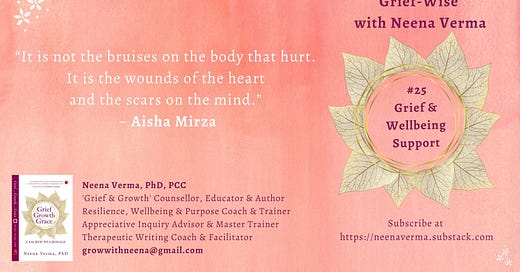


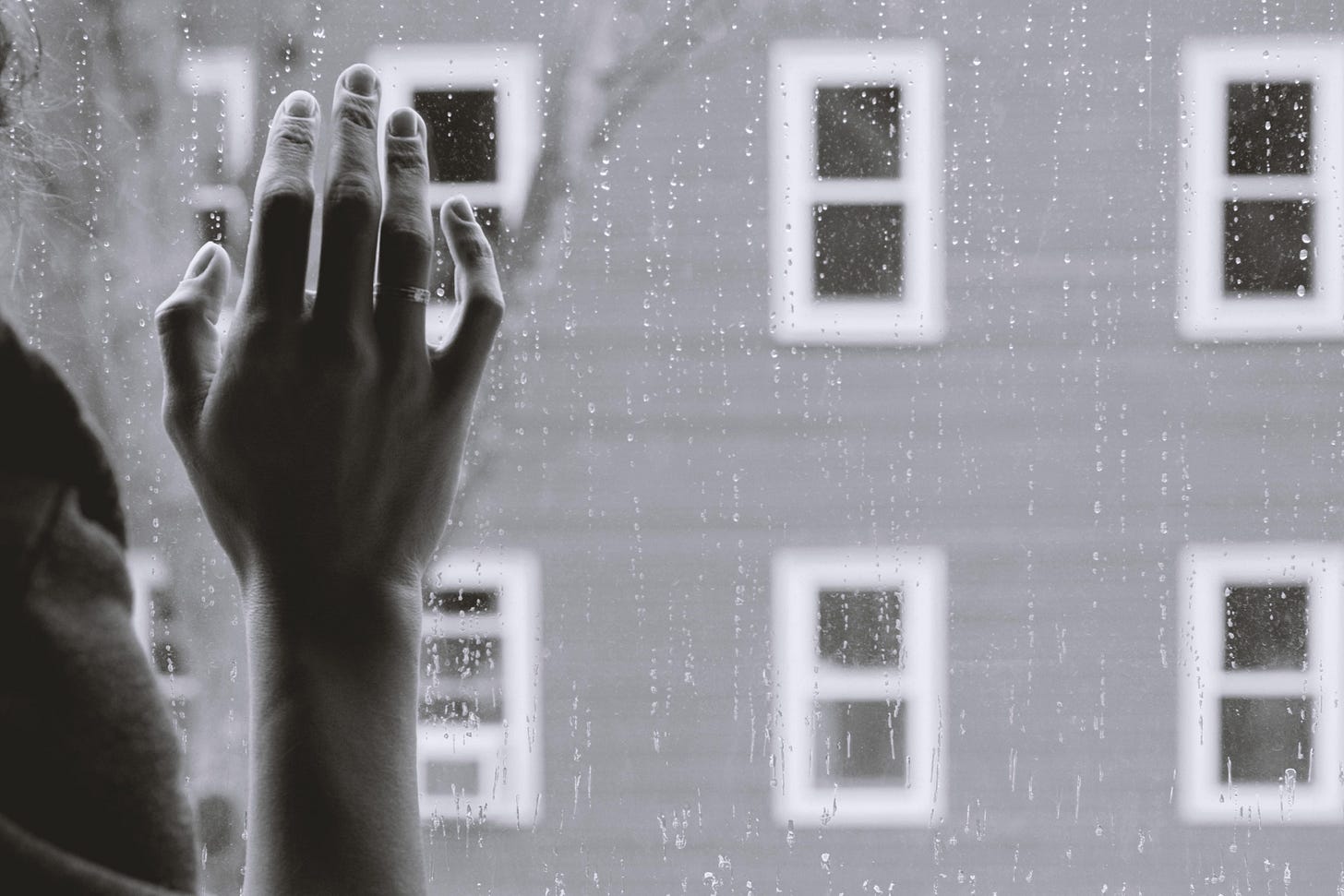
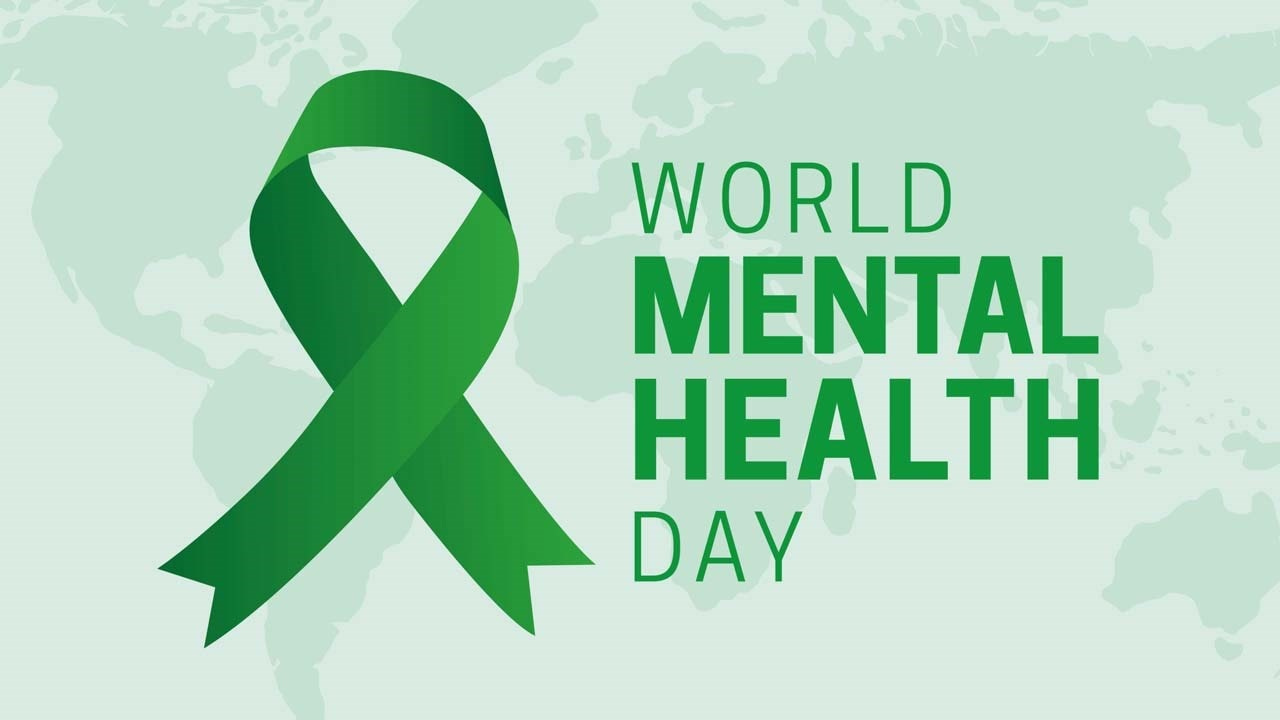

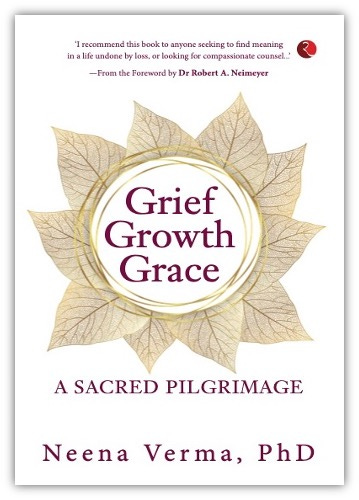
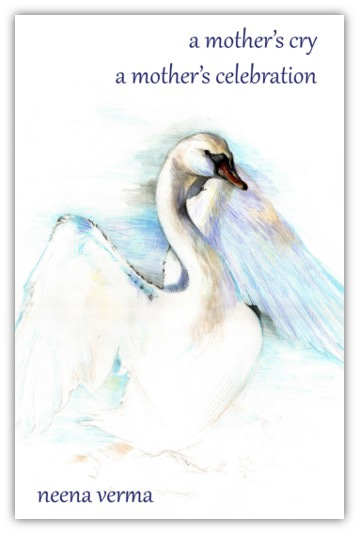
Very touching....as always.
At times i feel that in earlier days of 'joint family system' and 'community living' there used to be an auto mechanism of grief sharing & wellbeing support. Even the words like depression/stress/mental health etc. were never heard of in earlier times. Now with the advent of nuclear families/rat race for material things, these words are getting associated with every household/individual.
Wonderful as usual Neenaji. A heart touching narration with beautiful quotes.